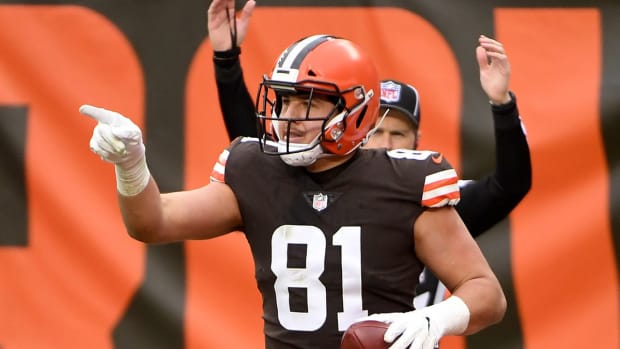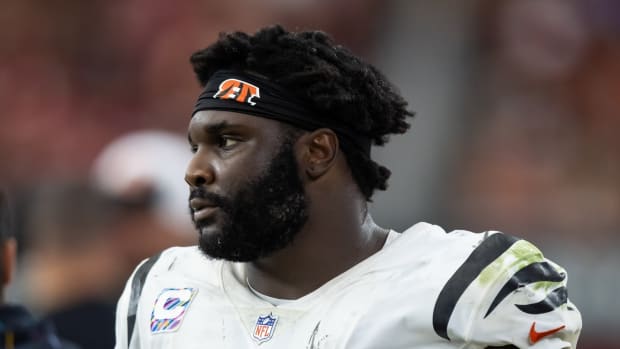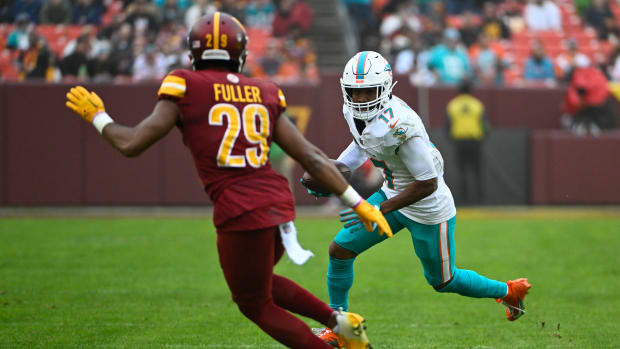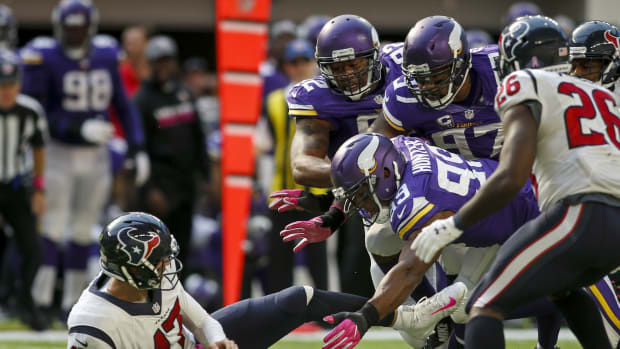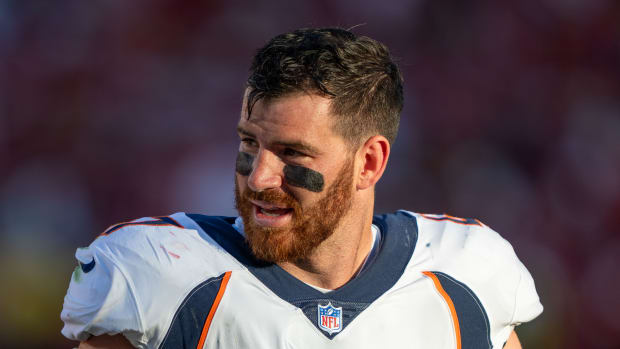MAQB: Eagles GM Howie Roseman Beats His Peers to the Punch With Draft Picks Trade
We’ll start with the draft this week, since the page is getting turned (pending any other sort of massive news development dropping on us the next few days) …
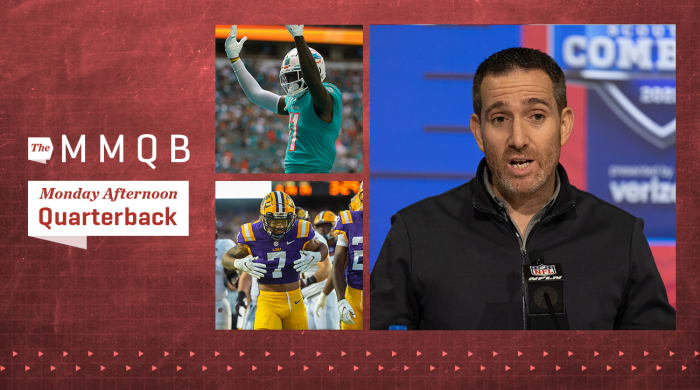
Roseman: Trevor Ruszkowski/USA TODAY Sports; Stingley Jr.: SCOTT CLAUSE/USA TODAY Network/USA TODAY NETWORK; Parker: Jasen Vinlove/USA TODAY Sports
• Here’s what the Eagles did Monday—they got ahead of the posse.
Over the next three weeks, more teams, and in particular those in the top half of the first round, will try to do what Philly GM Howie Roseman just did, and move picks from this year to next year. There are two reasons for it.
1. The strength of this year’s class is in the amount of starters there are from the middle of the first round into Day Three. Conversely, the top is shaky. I’ve had multiple teams tell me there may not be a player in the class that would’ve gone in the top 12 picks last year. The outlook for next year, with Alabama freak-show Will Anderson as the headline, is brighter, as it stands right now.
2. This is not the year to be looking for a quarterback. Next year, Ohio State’s C.J. Stroud and Bama’s Bryce Young loom as high picks, and there are guys like Miami’s Tyler Van Dyke who’ve shown promise that they could grow into high-end prospects. So high picks next year, whether you’re looking for a quarterback then or not, figure to be more valuable.
To me, I’d guess this means the Eagles stick with Jalen Hurts in 2022 (though I’d heard them connected to Malik Willis the last couple weeks) and see how Hurts progresses. If he doesn’t show them something, then they get aggressive with those picks to get either a veteran (and who knows who’ll be available then) or a rookie. If he looks great, well, then you have ammo to put more around him.
Regardless, this represents really good value for Philly. I had one exec bring this up to me in the aftermath of the deal—you could look at it as two separate trades. One would be the 16th, 19th picks (1,875 points on the draft value chart) for the 18th pick, 101st pick, and next year’s first-rounder (1,971 points on the chart); the second would be the 194th pick for the 237th pick and a 2024 second-rounder.
That’s pretty good work by Philly GM Howie Roseman.
• As for the Saints side of it, I don’t love it, but I get it. They’ve done well with these sorts of deals in the past, because they’ve drafted really, really well over the last seven years or so, and have a way of getting guys later in the draft.
What New Orleans needs right now is young, cheap talent, given the extent to which they’ve stretched the salary cap. Five years ago, a historic class (Marshon Lattimore, Ryan Ramczyk, Marcus Williams, Alvin Kamara, Trey Hendrickson, Alex Anzalone) helped them navigate a similar situation and created a championship window for the team at the end of Drew Brees’s career by allowing the team to keep its core in place while retooling.
New Orleans now has the 16th, 19th, 49th and 98th picks to work with.
• Derek Stingley Jr.’s pro day is in Baton Rouge, and I think the LSU corner may be this year’s draft’s most interesting prospect. Stingley killed it as a freshman—starting from day one for the Tigers a couple months after his 18th birthday (he doesn’t turn 21 until June) and emerging as one of the best players on their star-studded national title team that fall. Since then, just about everything’s gone sideways. After starting 15 games in 2019, he’s played in just 10 the last two years, and that’s where the questions really begin.
Yes, he’s had injuries. But there were also questions on whether or not he was trying to manage his way to the draft the last two years, given where his stock was coming out of 2019—and where his dad’s role in that would lie. I’d heard, in fact, once it’d become pretty clear to the family what a mess LSU had become under Ed Orgeron, his dad became leery on his son taking on too much risk ahead of his eligibility for the draft.
So there’s a lot to sort through here.
“I think he’s probably one of the five most talented players in the draft, especially if you’re looking at the tape from 2019,” said one AFC scout assigned to LSU. The problem, everyone knows, is that he really hasn’t played to that standard in a while. Some of that’s due to injuries, some of it’s due coaching changes. There are just lots of variables that give you concern. He’s an interesting prospect.
“He’s still a really good player. And he could end up falling like [Micah] Parsons did, where everyone knew he was the most talented guy, but he just gave guys enough pause to pass.”
If there’s any criticism of Stingley’s skill set, outside of the effort question the last two years, it centers on how quick-twitch he is—but he’s a bigger, longer player for the position, and is seen as more explosive in that regard than a similar guy in Patrick Surtain, who went in the top 10 last year and excelled as a rookie. Bottom line, Stingley has the potential to be elite at the position in the pros, and even brings NFL bloodlines with him.
And those bloodlines could help explain why his family’s been protective since his starry freshman year. His grandfather, Darryl, was the Patriots receiver who was paralyzed by Raiders enforcer Jack Tatum in the 1970s.
Regardless, there’s a lot for teams to dig through here, and Wednesday will be a big day for him in that regard, in that Stingley will have a shot to confirm what he’s flashed athletically, and talk to teams about the other stuff, too. This much, I can say—if he’d played the last two years like he did in 2019, he’d be a Top 5 lock. We’ll see if can still find a way to go that high in three weeks.
• If you asked me today who’d be the first pick in the draft, I’d give you two names for Jacksonville right off the bat—N.C. State OT Ikem Ekwonu and Michigan DE Aidan Hutchinson. That they were in North Florida together was no mistake. Both are repped by agent Mike McCartney, and McCartney put both guys on a pitch count as to the amount of traveling they’d post-pro day.
Both guys will visit the two New York teams, since the Jets pick fourth and 10th, and the Giants pick fifth and seventh, and the two teams were amenable to working together so Ekwonu and Hutchinson wouldn’t have to take two trips apiece to see both teams. Both guys will also visit the teams they’re local to—that’s the Lions (second pick) for Hutchinson and the Panthers (sixth pick) for Ekwonu. And each were planning to visit the Texans (third pick), but haven’t heard from Houston as of yet.
That means, as it stands now, those guys will only have to go two places each between pro day and the draft. The upshot is that when they get to their teams at the beginning of May, they won’t be worn down, and they will have been allowed to focus on their training—both have been working to get back into football shape after being focused for a couple months on combine training.
From there, the idea is that each guy will be better positioned to play well from day one.
• We covered the Dolphins’ end of the DeVante Parker trade in this morning’s column. We’ll cover why the Patriots did it now. Five reasons for you.
1. It’s a pick swap, with the Patriots moving a single selection down two rounds, with the one going out being a 2023 pick (giving Bill Belichick and Matt Groh a year to recoup the selection). Me? I’d hate to give up a top 100 pick like this, and think it’s hard to turn a fifth-rounder into a real player. But Belichick’s got a long history at looking at his war chest of picks in volume, and this trade doesn’t hurt him there.
2. Parker’s cheap. He’ll cost $6.25 million this year and $6.3 million next year, with $1 million of that coming in roster bonuses, and $200,000 in workout bonuses (with an extra $1.5 million available in incentives each year).
3. Parker has experience in the Patriots’ system and program, having played for Brian Flores the last three years. And in the closest facsimile to the New England offense he was a part of, under then-coordinator Chad O’Shea in 2019, he had by far the best year of his career (72 catches, 1,202 yards, nine TDs, with 58 of his 72 catches going for first downs).
4. Parker has been excellent against the Patriots. Three of the 11 100-yard games he’s had over his seven-year career came against Belichick. And Belichick’s always lusted for players who’ve burned him (another ex-Dolphin, Wes Welker, might be the best example of it).
5. The Patriots had clear needs at receiver, on the offensive line, at linebacker and corner. This, at the very least, makes one of those less pressing, which gives the team flexibility going into the draft.
So what is New England getting? “He offers size, length, athletic ability and catch radius on the perimeter,” said one veteran AFC exec, echoing what others told me. “He’s a bigger target, and can be a starter, but as 2, not a 1.” The biggest question will be whether the Patriots can keep healthy—because that’s been a constant problem for Parker. If they can, then this is a nice piece for Mac Jones.
(The other big question is why the Dolphins traded him in-division, which I’d assume they wouldn’t have done if an equal offer came from another team. That means either Miami’s other suitors were way off what the Patriots were offering, or the Dolphins weren’t worried about Parker coming back to make them pay.)
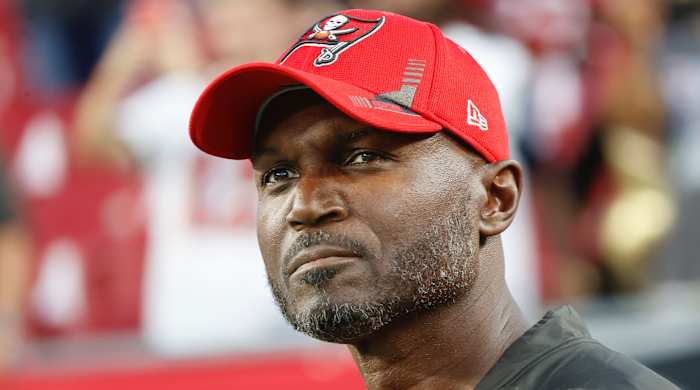
Todd Bowles is getting a second shot at head coaching after going 24–40 with the Jets between 2015–18.
Kim Klement/USA TODAY Sports
• I’m gonna give Todd Bowles some credit here—everyone knows what sort of hand he was dealt in New York, and yet he’s continued to take the high road on his time there. In fact, when I asked the other day what he learned from that time, he went out of his way to show his appreciation for the Jets.
“I think the experience was the biggest lesson,” Bowles told me. “I don’t regret anything because it made me a better coach. Everybody wishes they’d have known then what they know now, so they could do it differently. But if you did it differently then, you wouldn’t have had the experience of going through it and learning, and becoming a better coach and a better person. I think the whole experience was a positive thing, but I learned a lot of things that four or five years later can help me because I’m older.
“But I have no regrets. I’m very thankful that Mr. [Woody] Johnson gave me a chance to prove myself. There were a lot of great people in that building. And the situation just wasn’t right. I think it’s right now.”
• Ron Rivera’s comments on Terry McLaurin, and all the smoke around D.K. Metcalf, is indicative of the makeup of the 2019 draft class of receivers (and every class since)—it was strong outside the first round. So it’ll be costly for Washington to keep McLaurin, and Seattle to keep Metcalf, just as it won’t be cheap for Tennessee to keep A.J. Brown or San Francisco to keep Deebo Samuel.
And because all four guys went outside the first round, the window to extend them is narrowed, because their teams don’t hold fifth-year options on them. Stay tuned to each one of those.
• Ravens owner Steve Bisciotti’s reaction to the Browns fully guaranteeing a five-year deal for Deshaun Watson was pretty notable.
"I had a reaction to it. I wish they hadn't guaranteed the whole contract,” he told Baltimore beat writers during the owners meeting. “To me, that's something that is groundbreaking and it will make negotiations harder with others. But it doesn't necessarily mean that we have to play that game. If I was in bogged-down negotiations with Lamar, then maybe I would have a quicker reaction to that news.”
Jackson’s been patient, and Watson getting what he got would be an obvious benefit of waiting, and taking on the injury risk of playing last year without a new contract, even though he was eligible for one. Whether or not the Ravens go where the Browns did will be important, too.
For if Watson’s deal is to set off a trend, and lead to wholesale change, it’ll have to happen through individual negotiations like this one. Bottom line, if Jackson gets the structure that Watson did, that’ll give Russell Wilson, Joe Burrow and Justin Herbert more reason to ask for the same thing in 2023. And if all five get it? Then, we’re talking about a new world for quarterbacks.
If they don’t? Then Watson’s deal becomes like Kirk Cousins’s deal in 2018, which proved to be an outlier as other quarterbacks landed new contracts in the years to follow.
• The Commanders’ statement on the ticket fiasco was pretty unequivocal—“There has been absolutely no withholding of ticket revenue at any time by the Commanders”—and there is one thing in it that rung true with other teams. In detailing how this stuff is audited, Washington illustrated how difficult it’d be to pull something like this off. One exec said to me last week, because of the auditing, what the team was accused of “would basically have to be cash off of the books.”
Which means either they didn’t do it, or there was some very deep level of fraud going on within the team (To be fair, that wouldn’t be the biggest shocker in the world).
• Big shoutout to Pat McAfee. Love seeing ex-players live their post-NFL lives on their terms, and the former Colts punter is basically personifying that now—in fact, I’d say he’s better suited to do what he’s doing now, in the WWE, and with his show, than he ever was to punt. And he was a damn good punter.
More NFL Coverage:
• GamePlan: Mahomes Isn't Worried About Tyreek Hill Trade
• Bruce Arians Left the NFL Coaching World Better Than He Found It
• Post–Free Agency NFL Power Rankings
• Mailbag: Do the Packers and Chiefs Go After Top Receivers?

































